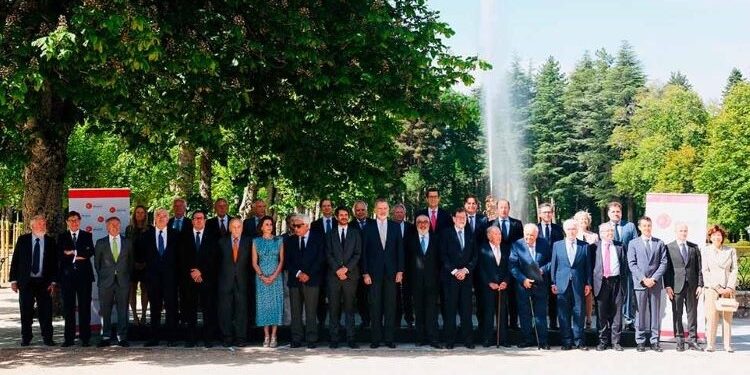Eduardo González
Yesterday, King Felipe VI presided over the meeting of the Board of Trustees of the Elcano Royal Institute of International and Strategic Studies at the Palacio de la Granja de San Ildefonso (Segovia), in which, among other matters, the accounts of this organization were discussed, which reveal a significant weight of the income contributed by institutional patrons.
The meeting was attended, among others, by the Minister of Culture, Ernest Urtasun, the former presidents of the Government Felipe González and Mariano Rajoy; the former minister, former European commissioner and representative of the People´s Party on the Board of Trustees Miguel Arias Cañete; former minister Dolores de Cospedal, vice president of the Elcano Royal Institute; José Luis Bonet, president of the Spanish Chamber of Commerce; Enrique V. Iglesias, former Ibero-American Secretary General; former minister Marcelino Oreja, patron emeritus of the Elcano Royal Institute; also former minister Gustavo Suárez Pertierra, former president of the Elcano Royal Institute; and representatives of companies, the University and the current management team.
During the meeting, the Board of Trustees examined and approved the annual accounts corresponding to the 2023 financial year. In the 2023 financial year, the Elcano Royal Institute achieved income of 5.5 million euros and recorded expenses of 5.2 million euros, which It represents an increase of 10% compared to 2022.
This increase has allowed us to obtain a surplus of 300,000 euros, which is being applied to reinforce the Institution’s human capital, as well as to launch a responsible artificial intelligence, digitization and data visualization project. As in the previous year, 65% of the Institute’s total expenditure was dedicated to personnel costs for the research, management and management teams, while investment in dissemination has increased to 17% of total expenditure.
The financing provided by the private sector amounted to 68% of total income, with the incorporation of a new employer and several partners. In addition, the contribution of institutional patrons represented 20% of the Institute’s total resources, with an increase in its proportion of total income of 5% compared to 2022. In recent years, the financing of institutional patrons (basically, Ministries) was 13% in 2021, 12% in 2022 and 14% in 2023.
Financing for national and international projects represented 12% of total income in 2023. In that year, the Institute’s participation in four consortia stood out, which develop research projects financed with funds from the European Union (ReConnect China, IBERIFIER, EUTEx and RAN Policy Support), and approximately 20 projects developed thanks to funding from various public and private institutions, such as Focus 2030 and the European Climate Foundation.







